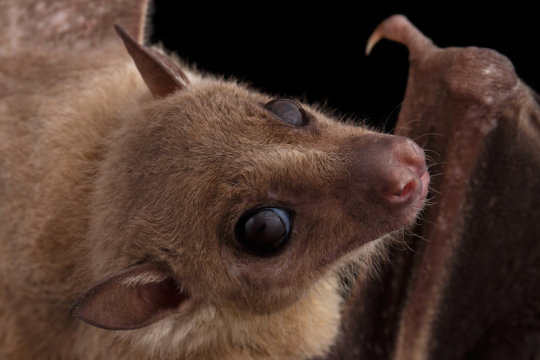[ad_1]
Female Egyptian fruit bats living in captivity will consistently take food right from the mouths of their male peers. Now the Tel Aviv University team that made that discovery is back with new evidence to explain why the males put up with it.
As reported in Current Biology on May 23, these male Egyptian fruit bats are repaid for their tolerance and generosity with sex.
“We found a strong relationship between producer-scrounger feeding interactions and reproduction,” says lead author Prof. Yossi Yovel of TAU’s George S. Wise Faculty of Life Sciences. “Namely, females bore pups of the males they most often scrounged food from. Three to four months before mating, the females start scrounging for food from several males. Then they eventually mate with one of the males, the one with which they forged the strongest bond.
“Originally, we wondered: Why do the producers of food allow scroungers to take food from their mouths? Maybe they’re stronger? But we found that most of the scroungers are female, and so we considered the possibility that females trade mating for food. This was our hypothesis, and, indeed, we found that this is the case.”
There are a variety of potential reasons why animals might be willing to share food. In some cases, food is shared with relatives. In others, the cost of defending food resources may be too great. But it’s also possible that sharing food sometimes comes with other delayed benefits, including sex.
Prof. Yovel’s team earlier found after watching three captive bat colonies over the course of a year that individuals either collected food for themselves or scrounged it from other individuals. That begged the question: Why do males allow other individuals and primarily females to literally take food out of their mouths?
Prof. Yovel’s observations revealed that those foraging interactions start many weeks before mating begins. Over time, the females intensify interactions with specific males before eventually mating with one of them.
To explore the food-for-sex hypothesis in the new study, the researchers monitored producer-scrounger interactions of a captive Egyptian fruit bat colony for more than a year. They later determined the paternity of the pups that were born in the colony based on genetics.
“The results were quite clear. Females gave birth to the young of males from which they had scrounged food,” explains Prof. Yovel. “The findings lend support for the food-for-sex hypothesis in this species.”
There were some other intriguing findings. For example, the researchers found that there was almost no overlap among males preferred by each female. It suggests that females choose males to scrounge from based on some form of individual preference. Those personal preferences also changed from year to year.
“Going forward, we intend to explore how these relationships evolve and change over many years,” concludes Prof. Yovel. “We would also like to find out how these interactions observed in captivity play out in wild populations.”
Story Source:
Materials provided by American Friends of Tel Aviv University. Note: Content may be edited for style and length.
[ad_2]















